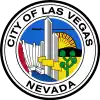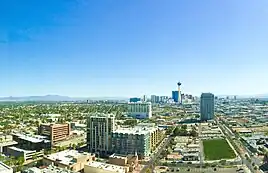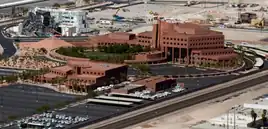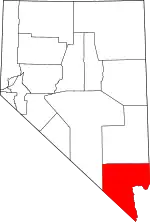Las Vegas
Las Vegas is a city in the American state of Nevada. There were 641,903 people living in the city in 2020, and more than 2,000,000 people living in the metropolitan area. It is the largest city in Nevada. Las Vegas is also the county seat of Clark County.
Las Vegas | |
|---|---|
Downtown Las Vegas World Market Center Lou Ruvo Center for Brain Health Clark County Government Center | |
 Flag  Seal | |
| Etymology: from Spanish las vegas 'the meadows' | |
| Nicknames: | |
| Coordinates: 36°10′30″N 115°08′11″W | |
| Country | United States |
| State | Nevada |
| County | Clark |
| Founded | May 15, 1905 |
| Incorporated | March 16, 1911 |
| Government | |
| • Type | Council–manager |
| • Mayor | Carolyn Goodman (I) |
| • Mayor Pro Tem | Brian Knudsen (D) |
| • City council | Members
|
| • City manager | Jorge Cervantes |
| Area | |
| • City | 141.91 sq mi (367.53 km2) |
| • Land | 141.85 sq mi (367.40 km2) |
| • Water | 0.05 sq mi (0.14 km2) |
| Elevation | 2,001 ft (610 m) |
| Population (2020) | |
| • City | 641,903 |
| • Rank | 75th in North America 25th in the United States 1st in Nevada |
| • Density | 4,525.16/sq mi (1,747.17/km2) |
| • Urban | 2,196,623 (US: 21st) |
| • Urban density | 5,046.3/sq mi (1,948.4/km2) |
| • Metro | 2,265,461 (US: 29th) |
| Demonym | Las Vegan |
| GDP | |
| • Las Vegas (MSA) | $160.7 billion (2022) |
| Time zone | UTC−08:00 (PST) |
| • Summer (DST) | UTC−07:00 (PDT) |
| ZIP Codes | 89044, 89054, 891xx |
| Area code | 702 & 725 |
| FIPS code | 32-40000 |
| GNIS feature ID | 847388 |
| Website | lasvegasnevada |
Las Vegas is famous for its casinos and resort hotels. It is one of the world's most popular places for tourism.
Hispanics (especially Mexicans and Cubans) and white people are the largest racial and ethnic groups in Las Vegas. Las Vegas has many Italians, Germans, English people and Irish people.
Politics
Las Vegas leans to the left. Three of the four congressional districts in Nevada include parts of Las Vegas, and all three congresspeople representing those districts are Democrats from Las Vegas.
History
Native Americans were the first to reside in the area, specifically the Paiute tribe. It was first called Las Vegas (which means The Meadows in the Spanish language) by the Spanish. The city is known for its dry weather, as is the rest of southern Nevada. It is surrounded by desert.
The US Army built Fort Baker there in 1864. Las Vegas has natural springs, where people used to stop for water when they were going to Los Angeles or other places in California.
In 1905, 110 acres owned by William A. Clark, on which he built a railroad to Southern California were auctioned and Las Vegas was founded as a railroad town.[6] Las Vegas officially became a city in 1911.
The Hispanic population in Las Vegas is growing and has rapidly increased. Most Latino Las Vegas residents are of Mexican, Cuban and Salvadoran descent.[7] Las Vegas also has a small Puerto Rican, Guatemalan, Spaniard, Peruvian, Colombian, Honduran, Nicaraguan and Argentine population. The most common European ancestries in Las Vegas are German, Irish, Italian, Polish, French, Scottish, Russian, Swedish, Norwegian, Dutch and Welsh. Filipino, Korean, Vietnamese, Japanese, Indian and Chinese are the most common Asian ancestries.[8]
People
There is a Mexican, Chinese, Greek, German, Korean, Japanese, French, Arab, Italian, Jewish, African-American, Turkish, Croatian, Polish, Filipino, Indian, Ethiopian and Chilean community in Las Vegas.[9]
Las Vegas has a growing Hispanic population. Many Hispanics in Las Vegas are of Mexican, Cuban and Salvadoran ancestry.[10]
Most of the foreign-born population were born in Mexico, the Philippines and El Salvador.[11]
References
- "Words and Their Stories: Nicknames for New Orleans and Las Vegas". VOA News. March 13, 2010. Retrieved January 29, 2012.
- Lovitt, Rob (December 15, 2009). "Will the real Las Vegas please stand up?". NBC News. Retrieved February 4, 2012.
- "ArcGIS REST Services Directory". United States Census Bureau. Retrieved September 19, 2022.
- "2020 Population and Housing State Data". United States Census Bureau. Retrieved August 22, 2021.
- "Total Gross Domestic Product for Las Vegas-Henderson-Paradise, NV (MSA)". fred.stlouisfed.org.
- "LasVegasNevada.Gov". Las Vegas City Hall. Retrieved 2021-03-26.
- "A booming Hispanic population in Las Vegas". 6 September 2018.
- "The Demographic Statistical Atlas of the United States - Statistical Atlas".
- The Peoples Of Las Vegas: One City, Many Faces.
- "A booming Hispanic population in Las Vegas". September 6, 2018.
- "Las Vegas, NV-AZ | Globalization, Urbanization & Migration (GUM) | Columbian College of Arts & Sciences | The George Washington University". Globalization, Urbanization & Migration (GUM) | Columbian College of Arts & Sciences.


.jpg.webp)
%252C_The_Strip_--_2012_--_6232.jpg.webp)


